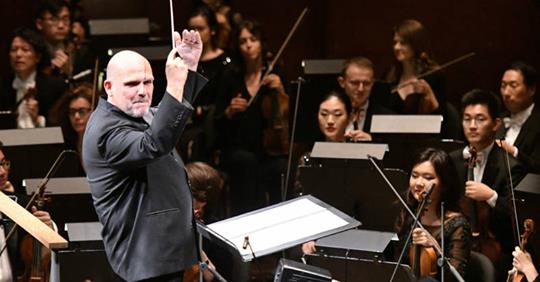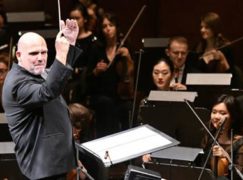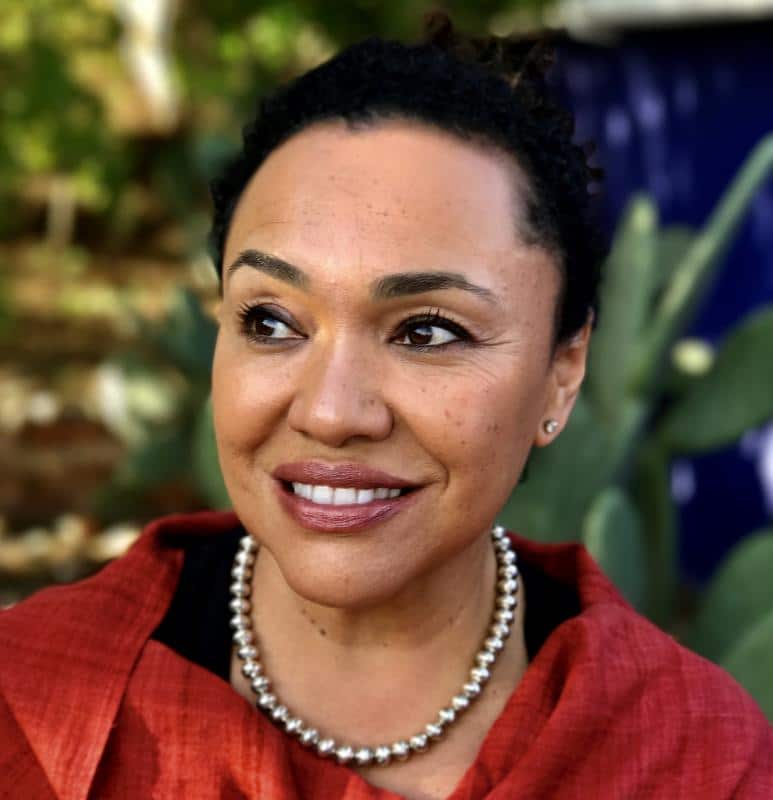Jaap says we really need a new conducting competition
mainThe International Conducting Competition Rotterdam will launch in June 2021.
Jaap Van Zweden says: ‘The ICCR is an extremely relevant and necessary new initiative. It offers young conductors the unique chance to work with numerous major orchestras. An essential experience that nowadays is very rare.’
Oh, really?

Here’s more: ICCR introduces a complete new formula by using multiple well-known orchestras with strong artistic profiles. Each round highlights a different genre, ranging from romantic to contemporary music, as well as opera and oratorio.
Ho-hum.






I wouldn’t put an ounce of credence into anything he says.
It’s just a means of assuring a labor pool for conductors.
Note that competitors will be “preselected.” Why is that?
The competitors in any competition of this nature are ‘pre-selected’; instrumentalists usually by audio or video recording, etc.. Nothing wrong with that.
What is your concern? What is your beef with Jaap? You certainly have the right to say what you want to on your own blog, but complete the criticism here. Why is his proposal a bad thing?
No, what we really need are young conductors to get their butts back into playing in orchestras, working as repetiteurs, then going onto assistant positions and work their way up. The old guys in the mythical Golden Age did it that way and it worked: Walter, Szell, Reiner, Solti, etc. Others, like Barbirolli, Colin Davis, John Georgiadis learned the craft playing in orchestras under the pros. The problem with too many conductors nowadays is they have little practical experience yet are convinced they will present the greatest Mahler 6th ever.
It hasn’t always worked that way:
1) Claudio Abbado: in 1958 won the international Serge Koussevitzky Competition for conductors; In 1963, he won the Dimitri Mitropoulos Prize for conductors
2) Gustavo Dudamel, in 2004 won the Gustav Mahler Conducting Award;
3) Seiji Ozawa, in 1959 won the International Besançon Competition for Young Conductors;
4) Zdeněk Mácal, in 1965 won the International Besançon Competition for Young Conductors;
5) Jesús López Cobos, in 1968 won the International Besançon Competition for Young Conductors;
6) Vasily Petrenko, in 2002 won the Cadaqués Orchestra International Conducting Competition
7) Gianandrea Noseda, in 1994 won the Cadaqués Orchestra International Conducting Competition
8) James DePriest, in 1965 won the Dimitri Metropoulos Conducting Competition
These are but examples and, of course, many also “worked their way up”.
Mirga Gražinytė-Tyla, 2012 Nestlé and Salzburg Young Conductors Competition !!!!
Surely you are not suggesting that she is an example from the “mythical Golden Age” referred to by Cubs Fan?
She is an antipode to Jaap van Zweden in a sense that all regular Slipped Disc readers cannot overlook.
Too much over exposure of her, leading to a backlash here. Someone already talked about it in other post.
I only mention Gražinytė-Tyla because of the barrage of blogposts on her by Norman Lebrecht.
Or how about Marin Alsop? In 1989, she won the Koussevitzky Prize as outstanding student conductor at the Tanglewood Music Center.
In all fairness, if you look at the winners of these competitions, many do not make it.
That is not even a competition. It was a prize for Mirga.
I do not expect this competition to be any different from other conducting competitions. It will, most likely, be a competition with a ridiculously low age limit (remember that most conductors start studying conducting after studying an instrument and having some years of experience, that experience is difficult to obtain, and that age discrimination is illegal in the EU), selection of participants will be obscure, and the winner will be whoever is more convenient for the agencies (whatever kind of conductor is in fashion – right now is young women). Bartok said it very well: competitions are for horses, not for artists.
It would be very hard for a horse to conduct an orchestra. But I would love to see the attempt.
Conducting competitions sometimes throw up conductors who go on to become major figures in the music business. Besancon winners include Ozawa, Macal, Lopez-Cobos, Alexander Gibson and Vänska, among others. But I wonder: apart from an occasional winner – like Simon Rattle at the John Player Competition – are the more major competitions that get more PR any more successful? Is JvZ’s new Competition likely to achieve its goals?
I think of the huge Maazel Vilar worldwide competition in 2002. At the finals in Carnegie Hall before a very distinguished Jury, Maazel told the audience they had witnessed the future of classical music! The joint winners were Asian, Xian Zhang and Bundit Ungrangsee, with Natalia Luis Bassa and Joji Hattori occupying the other places. Ms Zhang has certainly developed a major career. The Thai-born Mr Ungrangsee appears to have given up conducting at least ten years ago in favour of becoming a businessman.
Ms Luis Bassa seems to conduct mostly two amateur orchestras in the UK, whereas Mr Hattori has a more active professional career in his native Japan and in Vienna where he spent his childhood.
The Maazel Vilar Competition was intended to showcase conducting talent with outstanding potential. Did it really succeed in that objective? Would not a residency with an established full-time professional orchestra be more beneficial to winners rather than a line in a biography and some cash, similar to the concert dates offered as part of the prize-package by several instrumental competitions?
Let’s not forget Dudamel went relatively far, but quited for a reason I don’t remember anymore.
Perhaps Maazel could remember it with that hughe memory for scores, resentment…anyway. lol
Why not offer a conducting competition that has no age limit? There are really good conductors who never got the break they deserve but can’t get the chance. Even all competitions discriminate against older conductors. There should be one open to anyone with a certain degree of experience. It shouldn’t all be about “young” conductors or female or whatever. How about finding undiscovered talent WHEREVER it is????
What you are describing resembles the Gilmore Award for pianists, which works pretty well.
Amen, brother. Competitions should be directed to those without a professional career regardless of the age.
But remember, conducting competitions winners are those who are preferred by the agencies that will sign them. And who do they prefer? Those who are easier to sell, because their profile is different or in fashion, not neccessarily because they are better.
Yes but I think it could really be a great story if some older conductor who never got a break actually got a shot and wowed everyone. Klaus Tennstedt had something slightly along these lines as his career didn’t take off until he got some breaks when he was in his mid-fifties I believe.
I don’t see what could be wrong with organising a conductor’s competition, if the aim is to offer experience and exposure. The trajectories of a conducting career are extremely diverse and subject to all kinds of obstacles and circumstances, i.e. it is not organised at all, as JvZweden knows himself all too well, who had quite some craziness of the environment to overcome. For any real musical talent apart from the instrumental ones, there is no pre-conditioned trajectory, and any attempt to create something supportive should be welcomed.
By the way, it does not seem a good idea to have a conducting trajectory beginning at conservatories or universities: students gifted for conducting should first embark upon thoroughly playing an instrument and if possible, getting experience in an orchestra.
Also, focussing on youngsters does not seem to be a fruitful idea, since often musicians much older who embark upon conducting, bring with them a wealth of experience which cannot be acquired when young.